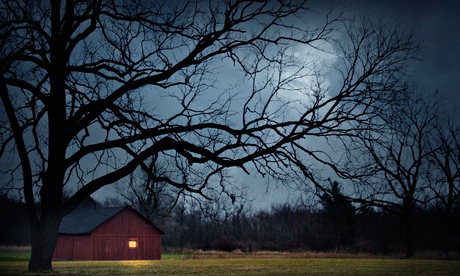
Andrea Maria Schenkel's debut, the short, brutal The Murder Farm, told of a murdered family in a German village after the second world war: old man Danner, his wife, their daughter, her two children and their new maid all slaughtered with a pick-axe. Based on a true story, it interlaid differing accounts of the killings and the family, and has been a huge hit in Schenkel's native Germany.
Her fourth, The Dark Meadow, treads much of the same ground. Short – this is a book to be read in an evening, although it will likely be dwelt upon for longer – it takes place in a small German village, in the aftermath of the war, is again based on a true story, and unfolds through multiple viewpoints. This time, though, a young mother, Afra, and her illegitimate two-year-old son, Albert, have been killed.
Afra had returned home to the house of her parents, Johann and Theres Zauner, in 1944, after she was thrown out of her job. She "went like a beaten dog", Schenkel tells us, her employer shouting after her "and just you be glad to get off so lightly … A tart sleeping around with Frenchmen and foreigners! A dirty whore." The letter she leaves for her Frenchman is disposed of, without a second's thought. The home she left at the age of 14, on the outskirts of the village of Finsterau, is the only place she can go. She doesn't even realise she's pregnant until she gets there.
Her parents, poor cottagers – her father a day labourer, her mother working on her sewing machine all night – take her in, but the village knows she and her father don't get on, that he can't stand the shame she has brought on the family. When Afra is found dead, and when her son dies in hospital shortly afterwards, the blame falls on Johann's shoulders. It doesn't help that, confused and apparently suffering from dementia, he confesses – and he winds up in prison. Eighteen years later, a drunk in a local bar rants about police never investigating properly, and the case is reopened. Schenkel intersperses accounts from police officers investigating the crime at the time with Afra's own day-to-day experiences.
The Dark Meadow is a slim book to pack such a lingering punch. Schenkel, the first German author to win the German Crime Book award twice in a row, carefully overlays differing versions of events as she shades in the truth, showing us a wider cast – Afra's unpleasantly forceful suitor, the passing itinerants, Johann slowly, bitterly, losing grip on his mind. There is no detective to get behind here, no sense of urgency; the case is, after all, 18 years old. But Schenkel – and the wonderful Anthea Bell, in her lucid, unobtrusive translation – is setting out to do something different. The Dark Meadow, in its evocative descriptions of postwar life in a German village, in its lack of sentimentality, pathos or melodrama, is a bleakly real portrait of injustice, poverty and hopelessness. Murder most foul, and shown here in all its pointless, meaningless cruelty.

